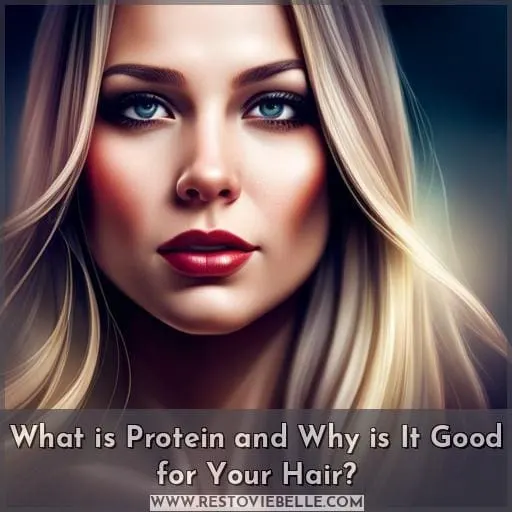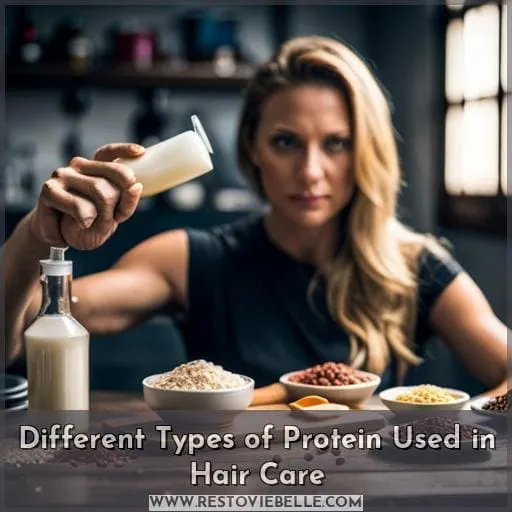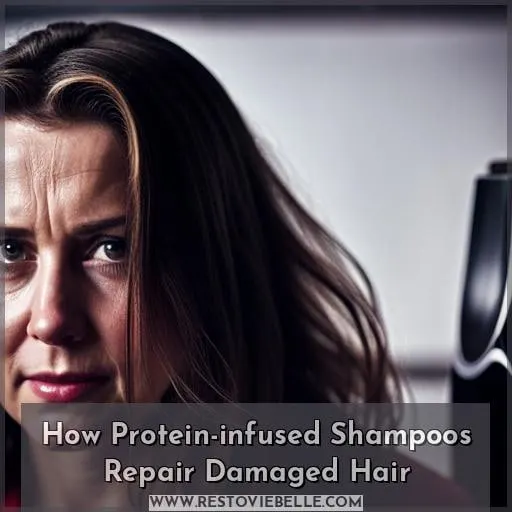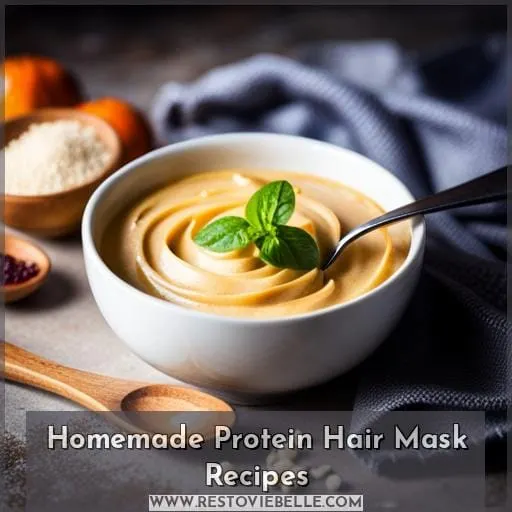This site is supported by our readers. We may earn a commission, at no cost to you, if you purchase through links.
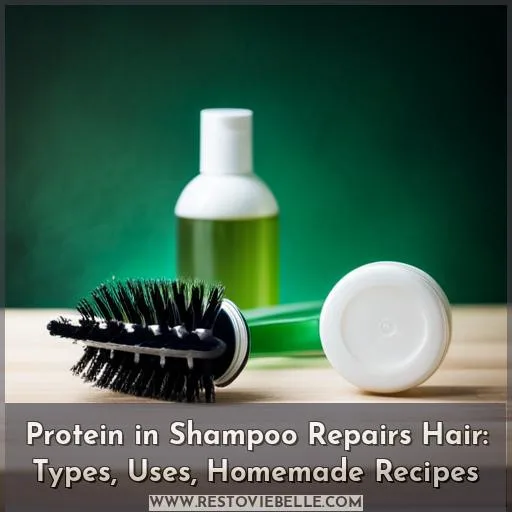 Repairing your damaged tresses calls for a special ingredient—protein.
Repairing your damaged tresses calls for a special ingredient—protein.
Infusing protein into shampoos regenerates each delicate strand by filling gaps in the hair structure.
Using a protein-packed weekly treatment undoes past harm from dyeing, blowdrying or straightening without needing daily use.
Let protein work its magic on the bonds within each fragile fiber so your hair looks and feels strong again.
Table Of Contents
Key Takeaways
- Protein strengthens hair follicles and shafts.
- Protein fills in gaps and bonds created by damage.
- Protein restores elasticity, strength, and shine to lackluster locks.
- Protein prevents hair from becoming brittle or straw-like.
What is Protein and Why is It Good for Your Hair?
Protein is a vital nutrient that benefits your hair in numerous ways. It strengthens hair follicles and shafts by filling in gaps and bonds created by damage.
The repair mechanism involves protein molecules attaching themselves within hair strands, reinforcing bonds and providing structure.
Common protein types used are keratin and collagen. Keratin protein matches the natural protein in hair while collagen, though not identical, still provides strengthening properties.
Using protein treatments such as homemade hair masks weekly can reinforce bonds damaged by styling, chemicals, or environmental factors.
Taking care not to overdo protein, which can make hair brittle or straw-like, occasional use helps fortify follicles and restore elasticity, strength, and shine to lackluster locks.
hair protein benefits, repair mechanism, protein types, DIY hair masks, protein frequency.
Different Types of Protein Used in Hair Care
Having examined how protein fortifies hair, we now turn to the various types used in hair care formulations.
Four common proteins that repair damaged locks include:
- Soy protein, which penetrates the hair cortex and protects it from future injury.
- Wheat protein, boosting moisture retention for softer, shinier strands.
- Hydrolyzed oat protein, sealing split ends to prevent further breakage.
- Collagen, the structural protein reinforcing hair fibers.
These and other proteins like keratin and gelatin offer an array of targeted hair healing benefits. Carefully selecting the right protein-infused shampoo enables you to customize your hair care regimen to restore luster to lackluster locks.
How Protein-infused Shampoos Repair Damaged Hair
With protein penetrating into the hair shafts, you’re strengthening and mending breaks by attracting moisture and sealing cuticles. Protein-infused shampoos work wonders for repairing damaged hair through their unique mechanism of action.
- Protein vs. Keratin:
While keratin is a type of protein, not all proteins in shampoo contain keratin. However, both have similar benefits for your hair.
- Protein for Color-Treated Hair:
Proteins help restore strength to color-treated strands that may be weakened due to chemical processes.
- Protein for Curly Hair:
Curly hair tends to be more prone to breakage, but with protein-infused shampoos, you can strengthen those curls from within.
- Protein for Dry Hair:
If your locks are lacking moisture and appear dull or frizzy, incorporating protein into your shampoo routine can provide much-needed hydration.
Scientific Approach:
The repair process occurs as the proteins bind together with the existing structure of your strands.
By leveraging these scientific principles in choosing a suitable product containing high-quality proteins like keratin or collagen while considering specific concerns such as color treatment or dryness levels will allow you on this path towards stronger and healthier-looking hair.
Tips for Selecting and Using a Protein Shampoo
Look for keratin, collagen, or other proteins high on the ingredients list when selecting a protein shampoo.
Avoid sulfates and silicones which can negate the benefits.
Use a protein shampoo once weekly rather than daily to avoid protein overload and brittle hair.
Look for Keratin
When selecting and using a protein shampoo, you’ll want to look for keratin as one of the key ingredients.
Keratin is a type of protein that’s naturally found in hair, making it an ideal choice for repairing damaged strands. It helps to strengthen and protect the hair shaft, improving its overall health and appearance.
Whether you have fine or coarse hair, high or low porosity, or any length or density, incorporating keratin into your hair care routine can help restore vitality to your locks.
Plus, if you have gluten sensitivity or are avoiding gluten exposure in your products due to dietary restrictions,
keratin-based shampoos provide a safe option as they don’t contain this allergen.
Collagen
Why are protein shampoos with collagen great for strengthening and protecting hair?
- Helps build keratin infrastructure to reduce breakage
- Boosts elasticity for less frizz
- Protective barrier seals in moisture
Collagen provides key building blocks for healthy hair. Use caution with supplements due to potential side effects.
Avoid Sulfates
To ensure the best results for your hair, it’s important to avoid shampoos containing sulfates. These harsh detergents can strip hair of natural oils leading to dryness and damage.
Instead, seek out gentle, sulfate-free cleansers like low-poo shampoos or conditioners for co-washing.
When selecting products, check ingredients lists for sulfates and choose options formulated with mild coconut-based surfactants or botanical extracts that protect hair’s health.
Silicones
You’ll want to check the ingredient list for silicones when selecting a protein shampoo.
Silicones like dimethicone provide smoothing and shine benefits, but can build up on hair over time.
Consider silicone alternatives like oils and butters that nourish hair without weighing it down.
Evaluate your hair’s needs and select ingredients judiciously for optimal hair health.
Use Weekly
Following those tips helps pick the right protein shampoo, but you shouldn’t overdo it – use the shampoo just once a week to avoid over-moisturizing your hair.
- Determine how often to use based on your hair type.
- Using protein shampoos too frequently can lead to product buildup and weigh down your strands.
- Regularly washing out excess proteins prevents them from overpowering your hair and maintains its natural balance of moisture and strength.
Not Daily
You shouldn’t use a protein shampoo every day, as overuse can cause protein overload, leaving hair feeling stiff, brittle, and straw-like.
| Frequency | Effect |
|---|---|
| Daily | Protein overload, brittle and dry hair |
| 2-3 times a week | Repair damaged hair, stimulate hair growth |
Using a protein shampoo too often can lead to an over-abundance of protein that coats and stiffens the hair shaft, resulting in breakage, slowed growth, and increased loss of already dry, fragile strands.
Moderate use supports strength and repair while avoiding these damaging effects.
Homemade Protein Hair Mask Recipes
After covering tips for choosing a protein shampoo, let’s explore making nourishing hair masks at home.
Whipping up a quick protein mask with simple kitchen ingredients lets you customize treatments to your hair’s needs.
For damaged or brittle strands, mash 1 ripe avocado with 1 egg yolk and 1 tablespoon olive oil.
For a lightweight moisture boost, blend 1 banana, 1/4 cup plain yogurt, and 2 tablespoons honey. Yogurt conditions with protein and probiotics as the banana and honey add skin-loving vitamins and antioxidants.
Steel-cut oats also build strong strands – combine 1/2 cup dry oats with enough water to achieve a spreadable paste.
Apply any mask generously and rinse after 15-30 minutes for hair that looks and feels rejuvenated.
Frequently Asked Questions (FAQs)
Can I use a protein shampoo daily?
You may use a protein shampoo daily, as long as it’s free of sulfates, silicones, and other harsh ingredients.
However, it’s important to use a moisturizing conditioner after using a protein shampoo to prevent your hair from becoming dry and brittle.
What happens if I use too much protein on my hair?
Using excessive protein on your hair can lead to brittleness and breakage.
While protein strengthens hair, too much disrupts the delicate balance of moisture, resulting in dryness and damage.
Moderation is key for healthy locks.
Do I still need conditioner if I use a protein shampoo?
Using a protein shampoo doesn’t eliminate the need for conditioner.
While protein can strengthen hair, it may also cause dryness and stiffness.
Conditioner helps restore moisture and manageability for optimal hair health and appearance.
How long does it take to see results from using a protein shampoo?
You may start seeing results from using a protein shampoo within a few weeks.
The proteins in the shampoo work to strengthen and nourish your hair, promoting healthier growth and reducing damage over time.
Conclusion
Have you considered replenishing your locks with protein? Fortifying shampoos stimulate follicle repair, injecting vital keratin, collagen, or wheat protein to regenerate each fiber.
Implementing weekly treatments with these concentrated formulas refortifies frail tresses, reversing previous heat and chemical damage without daily use.
Let protein-rich products reinforce weak bonds so your hair regains strength and shine.

